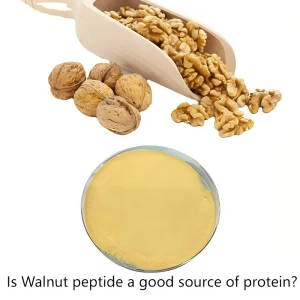Is Walnut peptide a good source of protein?

Walnut peptide powder is a fantastic plant-based protein option that’s gaining popularity for its nutritional benefits and versatility. Made from walnut residue through a process called enzymatic hydrolysis, it breaks down walnut proteins into smaller, easy-to-digest peptides packed with essential amino acids. These support muscle repair, hormone production, and overall wellness. In this article, we’ll explore why walnut peptide is a great protein source, its health benefits, and how it fits into various diets.
Rich in High-Quality Protein
Walnut peptides are loaded with essential amino acids, the building blocks your body needs for muscle growth and other vital functions. Studies show walnut protein contains all eight essential amino acids in proportions that meet World Health Organization standards, making it a complete protein. The peptide form, with molecules typically under 6,000 Da, is easier for your body to absorb than whole proteins. A scoop of walnut peptide powder can give you a solid protein boost, similar to other plant-based options like pea or soy protein.
Great for Muscle Recovery
If you’re hitting the gym or staying active, walnut peptide powder can help with muscle recovery. Its amino acids support tissue repair and growth, making it a go-to for athletes or anyone with an active lifestyle. Research suggests that walnut peptides, when consumed after exercise, can speed up recovery by delivering amino acids quickly to your muscles. Plus, its smooth texture and high solubility make it a breeze to mix into shakes or meals without feeling heavy.
Extra Health Benefits
Walnut peptides aren’t just about protein—they come with bonus health perks. They’re rich in antioxidants, which help fight inflammation and protect your cells from damage. This can support heart health and may lower the risk of chronic conditions. Some studies also point to walnut peptides helping with blood sugar control and blood pressure management by inhibiting certain enzymes. These benefits make it a smart choice for anyone looking to boost overall health.
Perfect for Special Diets
Whether you’re vegan, gluten-free, or just trying to eat cleaner, walnut peptide powder fits the bill. It’s naturally free of gluten and animal products, making it ideal for those with dietary restrictions. Made from walnut residue—a byproduct of oil extraction—it’s also a sustainable choice. Its mild, slightly nutty flavor blends well into smoothies, baked goods, or even soups, so you can add protein to your meals without changing their taste too much.
How It Stacks Up
Compared to other plant-based proteins, walnut peptides shine for their digestibility and extra bioactive benefits. While pea protein might pack a bit more protein per serving, walnut peptides offer unique antioxidant and anti-inflammatory properties. They’re also more soluble than whole walnut protein, making them easier to use in recipes. The downside? They can be pricier due to the specialized production process, but the benefits often outweigh the cost for many users.
Who Should Use It?
Walnut peptide powder is a great fit for a wide range of people. Vegans and vegetarians can use it to meet their protein needs, while athletes will appreciate its recovery benefits. It’s also gentle on the stomach, making it suitable for those with digestive sensitivities. However, if you’re allergic to walnuts, steer clear. As with any new supplement, check with a doctor if you have health concerns before adding it to your routine.
Why Go for Walnut Peptide?
Walnut peptide powder stands out as a nutrient-rich, eco-friendly protein source with benefits beyond just muscle support. Its complete amino acid profile, easy digestion, and added health perks make it a top pick.
